In Derry / Londonderry you can take a very special city tour: In about an hour you can walk once around the old city centre on the completely preserved historic city wall – and you can’t do that in any other city on the island of Ireland….
Page Contents (click line to jump the text)
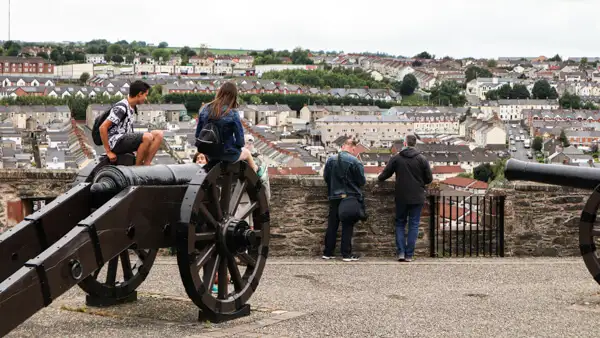
Intro
I admit it bluntly: I’m not a city person. I like to see beautiful landscapes all day long, in cities I’ve usually had enough after an hour or two…
So it’s all the better that you can visit Derry / Londonderry in a good hour – or rather walk round it – on the city wall.
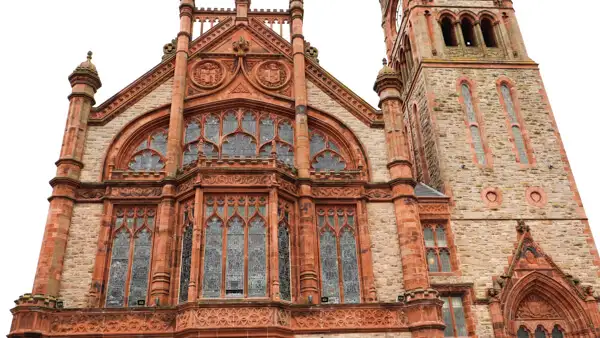
That’s what I did: from the Peace Bridge, across the Guildhall to the Tower Museum and then once around the city centre on the city wall.
You see lots of sights and gather lots of impressions. And you’ll get an idea of which places in the city centre you’d like to visit again later.
Background information on Derry / Londonderry
The city of Derry / Londonderry is a divided city, as the name suggests: Derry is the Irish name and Londonderry is the English name.
If you say “Londonderry” to a republican of Irish descent, you will be severely reprimanded and if you say “Derry” to a unionist of English or Scottish descent, you will also be severely reprimanded. So in this city you have a high chance of making yourself unpopular. It’s best to say “Derry/Londonderry”, be patiently corrected (several times a day) and stay out of any form of political discussion.
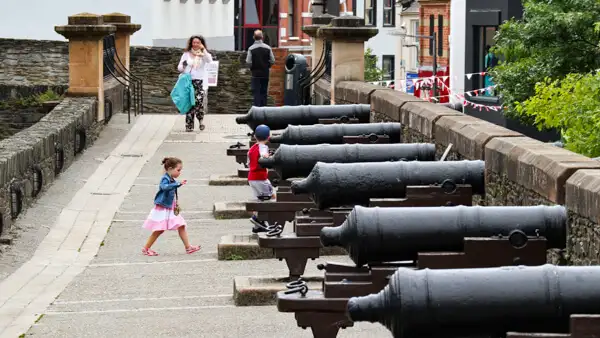
So what is this all about? In the Northern Ireland conflict of the 1960s and 1970s, radical groups from both parties also fought each other with explosives and weapons. British troops attempted to bring Northern Ireland and, in particular, the IRA, which was categorised as a terrorist organisation, under control by force, which in turn led to enormous violent clashes, particularly in Derry/Londonderry. A ceasefire was finally negotiated by both sides in 1975.
In this context, there is always talk of Catholics and Protestants, but it is less about religion and more about the question of whether Northern Ireland should remain part of the United Kingdom (majority Protestant) or be reunited with the Republic of Ireland (majority Catholic).
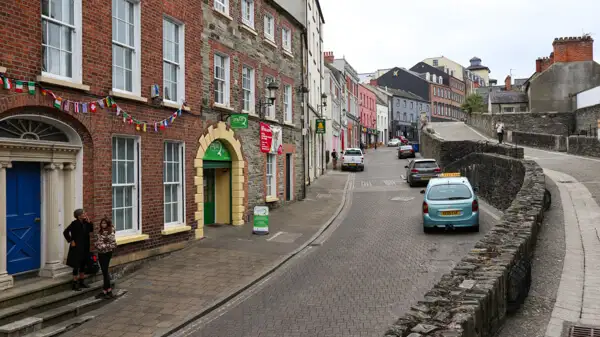
Tourists no longer need to fear bomb attacks in Derry/Londonderry, but the two population groups are still at odds, which sometimes leaves visitors with a less than relaxed impression.
But this is also an important part of the recent history of the Irish island and is part of the city.
Let’s return to the older history of the city: the famous city wall was built around 1613-1618. The walls were intended to protect the inhabitants, the majority of whom were settlers from England or Scotland and their descendants, from Irish rebels.
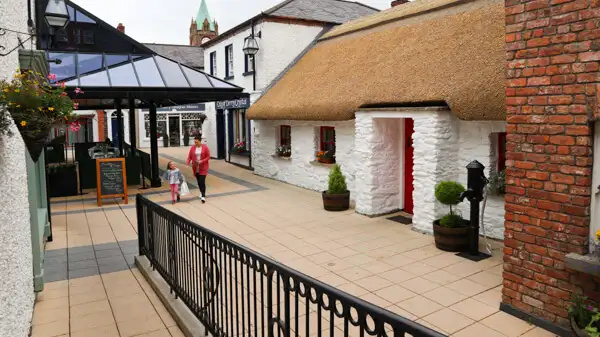
In the same century, the city was besieged three times but never conquered, which speaks for the quality of the walls, which were protected by powerful artillery bastions. Today you can still find old cannons on the walls. Some of today’s walls are still very high, some have been demolished and are considerably lower, but overall they are still very well intact.
A tour of the city walls of Derry / Londonderry
The tour of the wall is around 2.5 kilometres long and can easily be completed in an hour. However, it took me a good 2 hours to complete the route, as the excursion was so interesting that I kept stopping to take photos.
If the whole tour takes too long, you can just walk part of the wall, there are always stairs to climb up or down.
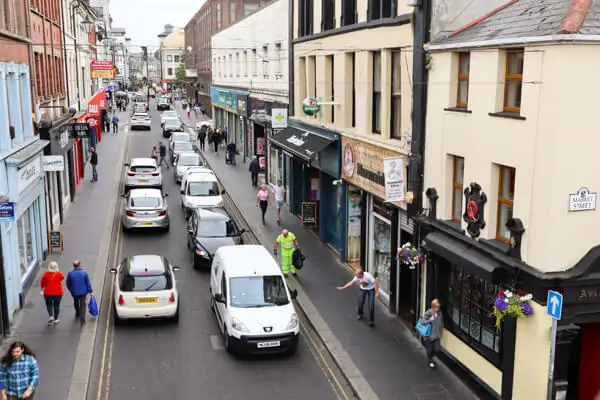
On your tour, you will see a highly interesting mix of old and new city centre. From your high vantage point, you can see both the city centre and the outskirts of the city at any time.
If you don’t have much time, I would definitely recommend a visit to the small Tower Museum and a tour around the Guildhall, as well as a walk across the Peace Bridge, which crosses the River Foyle in a curved line in front of the Guildhall.
You can find more information about the city here: https://www.visitderry.com/.
What else you can do in the area
From here you can take a day trip around the Inishowen Peninsula, the northernmost point of which, Malin Head, is also the northernmost point of the island of Ireland. Malin Head itself is not that interesting, but the drive around the peninsula is very scenic. See: https://www.govisitinishowen.com/directories/driving-routes-inishowen-wild-atlantic-way-donegal/.
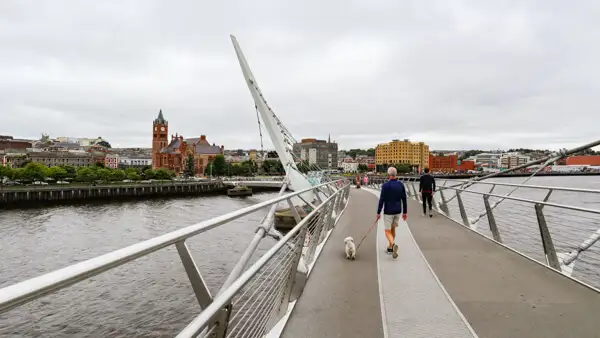
You can combine Derry / Londonderry with a tour to Fanad Head and Fanad Head Lighthouse. I have linked my own article on this for you below. For the Fanad Head Lighthouse website, see: https://fanadlighthouse.com/.
From here you can also easily head for the Causeway Coast, via Dunluce Castle and the Giant’s Causeway. See also: https://discovernorthernireland.com/things-to-do/dunluce-castle-p675011, and: https://www.nationaltrust.org.uk/visit/northern-ireland/giants-causeway.
Conclusion
Is Derry / Londonderry a beautiful city? Well, I like historic cities better than modern cities and this city is a mixture of both. It has many beautiful old, historic buildings, but you also see many modern neighbourhoods, especially outside the walls, which I personally don’t find so beautiful.
Is it an interesting city? Yes, I would definitely confirm that. The contrast between old and new, the turbulent history of the city and the subliminal conflicts that can still be felt make it very interesting.
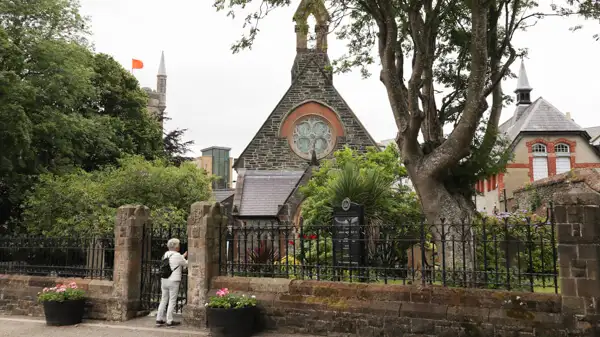
And where I can orientate myself on the older walls and masonry, I find many beautiful corners!
Should you visit the city and walk the walls? Yes!
I wish you lots of fun!
More interesting articles for you
FANAD HEAD LIGHTHOUSE – IN THE FAR NORTH OF IRELAND
THE CLIFFS OF SLIEVE LEAGUE – MAJESTIC AND MARVELLOUS
GLENCOLUMBCILLE FOLK VILLAGE – LIFE IN RURAL IRELAND IN THE PAST
POWERSCOURT HOUSE AND GARDENS
Picture credits cover picture: On the city wall of Derry / Londonderry, photo: Ulrich Knüppel-Gertberg (www.irland-insider.de, www.ireland-insider.com)